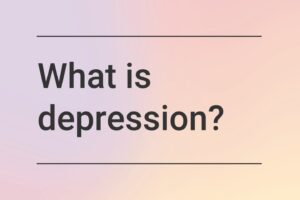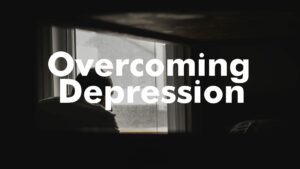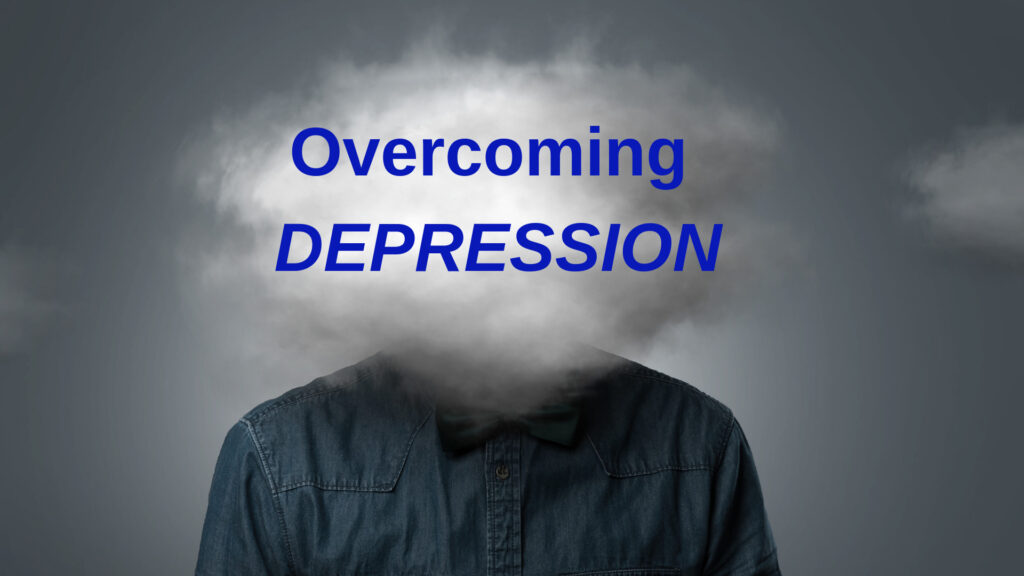Depression is one of the most common mental health conditions in the United States. It can affect anyone, regardless of age, race, or gender. According to the National Institute of Mental Health, an estimated million adults in the world. had at least one major depressive episode in 2016. If you are one of those people, you know how difficult it can be to overcome depression on your own. This comprehensive guide to recovery will provide you with all the information you need to get started on your journey to overcoming depression.
Contents
What Is Depression?
 Depression is a serious medical illness that negatively affects how you feel, the way you think, and how you act. Fortunately, it is also treatable. Depression causes feelings of sadness or a loss of interest in activities once enjoyed. It can lead to a variety of emotional and physical problems and can decrease a person’s ability to function at work and at home.
Depression is a serious medical illness that negatively affects how you feel, the way you think, and how you act. Fortunately, it is also treatable. Depression causes feelings of sadness or a loss of interest in activities once enjoyed. It can lead to a variety of emotional and physical problems and can decrease a person’s ability to function at work and at home.
Depression symptoms can vary from mild to severe and can include:
- Persistent sad, anxious, or “empty” mood
- Feelings of hopelessness, pessimism
- Angry outbursts, irritability, or frustration over small matters
- Loss of interest or pleasure in hobbies or activities
- Decreased energy, fatigue, being “slowed down”
- Difficulty concentrating, remembering details, and making decisions
- Insomnia, early morning awakening, or oversleeping
- Loss of appetite and/or weight loss or overeating and weight gain
- Thoughts of death or suicide; suicide attempts
- Restlessness, irritability
- Persistent physical symptoms that do not respond to treatment, such as headaches, digestive disorders, and chronic pain.
It is important to remember that these symptoms can be part of life’s normal lows. But the more symptoms you have, the longer they last (two weeks is a good rule of thumb), and the more severe they are—the stronger the indication that you are dealing with depression.
Treating depression can be incredibly difficult, but there are several ways to get help. If you think you may be suffering from depression, the first step is to talk to your doctor or mental health professional. They will be able to give you a diagnosis and come up with a treatment plan that’s right for you.
Some treatment options for depression include medications and /or therapy. Medications can help to control the symptoms of depression, but they don’t cure it. Therapy can help you understand and work through the issues that may be causing your depression. It can also teach you new ways to cope with your symptoms.
What Does ” Overcoming Depression” Mean?
 Overcoming depression is different for everyone. For some people, it may mean getting out of bed every day and going to work or school. For others, it may mean being able to handle their emotions without self-destructive behaviors like substance abuse or disordered eating. And for others still, it may mean simply not feeling depressed all the time.
Overcoming depression is different for everyone. For some people, it may mean getting out of bed every day and going to work or school. For others, it may mean being able to handle their emotions without self-destructive behaviors like substance abuse or disordered eating. And for others still, it may mean simply not feeling depressed all the time.
There is no one right way to overcome depression. But some general principles can help guide you on your journey to recovery. There are some things you can do to make overcoming depression easier, and there are some things you should avoid doing that will only make it harder.
There are many benefits of overcoming depression. Some benefits may be immediately apparent, like improved work performance or better grades in school. Other benefits may be less obvious, but no less important, like improved relationships with friends and family or a greater sense of overall well-being.
Whatever your reason for wanting to overcome depression, know that it is possible. With hard work and dedication, you can make it happen. One can find many helpful tips online or by speaking with a therapist. Friends and family can also be supportive in this journey. Overcoming depression is possible with the right mindset and resources.
What Not to Do When Trying to Overcome Depression?
When you’re trying to overcome depression, there are some things you should avoid doing that will only make it harder. One of the most important things to avoid is self-destructive behaviors like substance abuse or disordered eating. These behaviors may seem like they help in the short term, but they make depression worse in the long run.
Another thing to avoid when overcoming depression is negative thinking. It’s important to stay positive and believe in yourself throughout the process. Negative thinking will only make recovery harder.
Finally, don’t try to do it all on your own. Overcoming depression is a difficult journey, and you’ll need all the support you can get. Reach out to friends and family, or seek professional help if you need it. Sometimes, all it takes is someone to listen and offer a helping hand.
You should also not try to bottle up your emotions. It is okay to feel sad, angry, or scared. These are all normal emotions and part of the human experience. Trying to bottle them up will only make things worse in the long run. Instead, try to express yourself in healthy ways, like journaling or talking to a friend.
What are Some Tips for Overcoming Depression?
There are some things you can do to make overcoming depression easier. One of the most important things you can do is develop a support system. This could be family, friends, or even a professional therapist. These people can offer guidance and understanding when you’re feeling low.
It’s also important to take care of yourself physically when you’re trying to overcome depression. This means eating a balanced diet, getting enough sleep, and exercising regularly. Taking care of your physical health will make it easier to take care of your mental health.
One of the most important things you can do is develop a support system. This could be friends and family, or it could be a professional therapist. Having people to talk to who understand what you’re going through can be a huge help.
Another thing you can do is educate yourself about depression. The more you know about the condition, the better equipped you will be to deal with it. There are many resources available online and in libraries that can help you learn more about depression and how to overcome it. There are also many support groups available that can provide emotional support.
If you are struggling with depression, it is important to seek professional help. A therapist can help you understand your condition and develop a treatment plan. Medication may also be necessary in some cases. If you are feeling suicidal, it is important to get help immediately and call a suicide hotline.
Different Ways For Overcoming Depression

There are many ways that people have found helpful for overcoming depression. Some people find that therapy, medication, and self-care work well for them. Others find that they need to read self-help books or talk to friends to work through their depression. Some people find that a combination of different methods is best for them.
If you are depressed, it is important to seek help from a professional. They can help you figure out what might be causing your depression and offer treatment options. If you are not sure if you are depressed, consider taking a self-assessment online or talking to your doctor.
Once you have sought professional help, there are many things you can do on your own to start feeling better. Some of these are:
Exercises
One of the main things you can do to improve your mood is to get some exercise. Exercise releases endorphins, which have mood-boosting effects. It can also help you sleep better, which can reduce fatigue and improve your energy levels. There are many different ways to get exercise, so find something that you enjoy and stick with it.
Some of these are:
- Going for a walk or run
- Taking a dance class
- Joining a sports team
- Doing yard work or gardening
Diet and Nutrition
 What you eat can also affect your mood. Eating a balanced diet with plenty of fruits, vegetables, and whole grains can help improve your energy levels and mood. Avoiding processed foods, sugary drinks, and excessive amounts of caffeine can also be helpful. If you think your diet might be affecting your mood, talk to a doctor or nutritionist. They can give you specific dietary recommendations.
What you eat can also affect your mood. Eating a balanced diet with plenty of fruits, vegetables, and whole grains can help improve your energy levels and mood. Avoiding processed foods, sugary drinks, and excessive amounts of caffeine can also be helpful. If you think your diet might be affecting your mood, talk to a doctor or nutritionist. They can give you specific dietary recommendations.
Some of the recommended foods are:
- Fruits and vegetables
- Whole grains
- Lean protein
- Healthy fats
Sleep
Getting enough sleep is also important for managing depression. Most adults need between seven and eight hours of sleep per night. If you are not getting enough sleep, it can worsen symptoms of fatigue, irritability, and anxiety. Creating a bedtime routine can help you get the rest you need. This might include turning off electronics an hour before bed, reading a book, or taking a bath.
Some tips for getting better sleep are:
- Establishing a regular sleep schedule
- Avoiding caffeine and alcohol before bed
- Creating a relaxing bedtime routine
- Exercising during the day
Talk To Someone You Trust
You should also talk to someone you trust about what you’re going through. This could be a friend, family member, therapist, or counselor. Talking to someone who will understand and support you can help reduce feelings of isolation and loneliness. It can also be helpful to talk about your experiences with depression to better understand what you’re going through.
Some things you might want to talk about are:
- Your symptoms
- How depression is affecting your life
- Your thoughts and feelings
- Treatment options
Yoga
An ancient form of exercise, yoga, has also been found to help manage depression. Yoga can help you relax and focus on the present moment. It can also improve your sleep and increase your energy levels. There are many different types of yoga, so find one that you enjoy and stick with it.
Some types of yoga are:
- Hatha yoga
- Kundalini yoga
- Bikram yoga
Meditation
Practicing meditation can also help reduce symptoms of depression. Meditation can help you focus on the present moment and let go of worries about the future or past. It can also help you become more aware of your thoughts and feelings. There are many different types of meditation, so find one that works best for you.
Some types of meditation are:
- Mindfulness meditation
- Guided meditation
- Transcendental Meditation
Aromatherapy
 One type of therapy that uses scent to improve mood is aromatherapy. Aromatherapy can be done using essential oils, which are concentrated forms of plant extracts. Essential oils are often used in diffusers, which disperse the scent into the air. You can also add a few drops of essential oil to a bath or massage it into your skin.
One type of therapy that uses scent to improve mood is aromatherapy. Aromatherapy can be done using essential oils, which are concentrated forms of plant extracts. Essential oils are often used in diffusers, which disperse the scent into the air. You can also add a few drops of essential oil to a bath or massage it into your skin.
Some essential oils that are used in aromatherapy are:
- Lavender
- Rose
- Bergamot
- Chamomile
Acupuncture
Acupuncture is another type of therapy that is helpful in managing depression. Also, Acupuncture involves inserting thin needles into the skin at specific points on the body. It is believed that this can help improve energy flow and balance the body’s systems. Acupuncture is usually done by a trained professional.
Some of these acupuncture points are:
- LI11
- ST36
- GB20
There are many different ways to manage depression. Some people may find that one treatment works better for them than others. It’s important to experiment and find what works best for you. Remember, it takes time to recover from depression. Be patient with yourself and stick with it. Recovery is possible.
Conclusion
Dealing with depression can be extremely difficult, but it is important to remember that you are not alone. There are many resources available to help you on your journey to recovery. With the right support, you can overcome this obstacle and live a happy and fulfilling life.
If you or someone you know is struggling with depression, please don’t hesitate to reach out for help. Remember, there is no shame in seeking assistance – only strength. Together, we can break the stigma surrounding mental health and create a more compassionate world for everyone.
Thank you for reading. I hope this article was helpful in some way. If you have any questions or comments, please feel free to contact us.
Hope this article was of help to you! If you are suffering from depression, you may seek help from Therapy Mantra. We have a team of highly trained and experienced therapists who can provide you with the tools and skills necessary for overcoming depression. Contact us today to schedule an online therapy or download our free Android or iOS app for more information.


